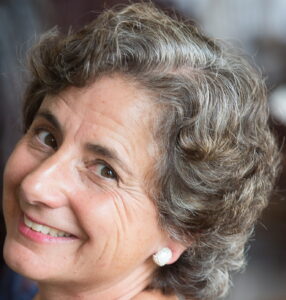This essay won first prize in the Golden Nib for non-fiction and just appeared in the 2023 edition of The Golden Nib, an anthology of the work of Virginia writers.
Last winter, we bought a car that came with many safety features, including a blind spot monitor. Unfortunately, the monitor did not prevent someone who borrowed the car from backing into a Mercedes Benz. I’m not upset about the mishap.
I have great affection for the borrower of my car which caused me to frame how I viewed the accident. I decided that the driver had been facing a Bermuda Triangle of extenuating circumstances: a drainage gulley, an impossibly narrow road, and of course, the Benz in a blind spot that our new detector did not detect. Fortunately, the Benz owner had a great attitude. She said, “Accidents happen. That’s why we have insurance.”
The collision disabled many of our car’s safety features, including the blind spot monitor. Because of supply chain issues, a dearth of repair persons at the dealership, and blah blah blah, we’ve had to wait seven months for the car to be fixed.
So, up until recently, whenever I started my car, a message flashed on the dashboard, “BLIND SPOT MONITOR UNAVAILABLE.” Those words sent a quiver of anxiety through my soul. My mind filled with possibilities of myriad annoying and/or lethal automotive and personal situations for which I now lacked warning.
Physiologically speaking, blind spots are a fact of life for us humans. A blind spot is an area within your vision that you cannot see, an area where your view is obstructed. Our eyes possess two blind spots at the entry point of each optic nerve, places where there are no light sensitive cells. The absence of light sensitive cells means that the brain receives no messages from those two areas. We don’t notice these blind spots because our minds fill up the blank areas with information it creates apart from reality.
German neuroscientist, Benedikt Ehinger, wondered if we subconsciously know that our filled-in vision is less trustworthy than real vision. He devised a study to test this question. Even when given evidence that shows the opposite, the study found that subjects trusted the information invented by their brain more than what they clearly saw in the outside world.
Ehinger observed that this information fits in with what we know about cognitive biases. He says, “When people hold strong beliefs, they are likely to ignore any evidence to the contrary.”
Years ago, when my oldest two boys were toddlers, I believed I was the paragon of parental parity. I recognized that one of my boys tended to pitch a fit to get his way, whereas his brother tended to go with the flow. Regardless, I knew I loved my five-year-old and three-year-old equally. Moreover, I felt convinced that I treated them equally. But one day, my friend, Margaret, gently told me that I often placated the fit-pitching boy to the detriment of his go-with-the-flow brother.
“Thank you for your observation,” was what my mouth said while my mind protested, “You’re dead wrong.”
Not long after, my father filmed the two boys and me as we banged on rhythm instruments while singing two thousand verses of She’ll Be Coming Around That Dang Mountain. At one point, the fit-pitching child declared that he wanted to switch instruments with the go-with-the-flow boy. Determined to make it to the end of the song without interruption, I grabbed the instrument from my easy-going child and handed it to the demanding child. As fit-pitching boy and I bellowed the last verses of the song, my other son looked bereft, which, of course, I didn’t notice at the time. Later, when I saw the clip, I faced visual evidence of my blind spot, me responding to one child in a way that harmed the other. Soon after, we visited a family therapist who made some great suggestions for how to change the dynamic. I listened to the advice, following it closely, which resulted in a positive shift in family dynamics and the overall keeping of peace.
People say that love is blind, meaning that when we love someone platonically or when we are in love with someone romantically, our love may blind us to certain realities, hence another blind spot to worry about. That characteristic of human love can come in handy when forgiving someone for banging up your new car, but it can have a damaging result when navigating youthful romance.
While in college, I’d met my first serious boyfriend on a camping trip with a large group of people who were training to be volunteers at a counseling center. We discovered our many multiple common interests (art, music, hiking) and clicked immediately. That first night, in the moonlight, beneath a stand of fragrant pine trees, we talked about our childhoods, our families, our hopes for the future. I had found a kindred spirit.
The next few months, we’d eat supper together on weekends, mostly just warming up tomato soup with shrimp bits on my illegal two-burner hot plate. Once, we snuck into the dining hall kitchen after hours and baked brownies. Distracted by the effort it took to be stealthy, we forgot to include eggs, so the result looked like molten lava. On winter break, we hitchhiked to Vermont, planning to ride the rails north into Canada, which, thank God, turned out to be too cold to attempt. I even brought the boy home to meet my Italian American family. I should have taken it as a sign when my grandmother whispered to me in broken English, “He too tall. Should cut off at knees.”
That spring, trouble arrived in Paradise. The guy lived in a coed dorm clear across campus. One of my friends said, “He is cheating on you with a girl in his dorm.”
Of course, I responded, “Ha ha. Not possible. We are soulmates.”
A little while later another friend said, “Your boyfriend is hooking up with that girl from Long Island. You’ve met her at his dorm.”
The girl with the heavy make-up, painted nails and a thick Long Island accent? No way.
However, where there is a will, there is a way. Apparently, the Long Island Lass had been lurking in the wings for weeks, perhaps months. I should have known. I’ll spare you the details, but the boyfriend’s behavior had left me plenty of hints. However, “there’s none so blind as those who will not see.” My infatuation had obscured what should have been obvious. Eventually, my kindred spirit and I parted ways.
Novelist Junot Diaz’s thoughts seem to resonate with my experiences and Ehinger’s research. He says, “We all have a blind spot and it is shaped exactly like us.” The nature of a blind spot is self-deception and lack of self-awareness. It is the filling in of a space with what we imagine and hope what might be there, instead of what is.
Are we doomed? Maybe not.
Back to the car. Prior to owning a car with a faulty blind spot detector, I compensated for blind spots by adjusting my mirrors before turning on the ignition, by looking into the mirrors before making any motoring decisions and by asking a passenger for help if my view is obstructed.
Did this method achieve perfect results? Nope. While trying to learn how to drive, I tended to look in my rearview mirror so much that my instructor decided to flip up the mirror as we rode around. And, later, after I got my license, I did manage to rip off my side mirror while backing out of a narrow garage. To be completely honest, the garage wasn’t all that narrow, I just hadn’t mastered backing up.
Although I’m not great with real life mirrors, when I remember to do so, making use of metaphorical mirrors has been helpful: routine self-evaluation, surrounding myself with wise, observant friends who care enough to give kind feedback, and being open to explore new ideas and opinions, even when they challenge what I firmly want to believe.
One last thought, some blind spots, the ones due to blinding love may belong in their own category. Blinding love is that inexplicably fierce love that empowers a person to make great sacrifices for a relative, friend or even a stranger. For example, think about the blinding, prodigious love people often feel toward their newborns, who arrive after nine months or so of a pregnancy that usually includes challenges and then labor, which almost always is painful. Babies pee and poop prodigiously and with great regularity. In the early weeks, they may scream through the night causing parents to abandon all hope of ever sleeping again. Despite that, most of those sleep-deprived parents would leap in front of a tractor trailer truck to save their peeing, pooping, screaming offspring.
Of course, there is the heroic blind love that ordinary folks extend to those around them in times of great peril, like the man who threw himself over his dance partner when the shooting began in Half Moon Bay or the young teacher in Virginia who, although grievously wounded, led her children to safety in another classroom before collapsing.
Yes, we need to beware of some blind spots, especially those that cause us to overlook danger. A solution? Consult your mirrors, both literal and metaphorical. Yet other blind spots, those blinding love blind spots just need to be appreciated and embraced.
###

(Photo by Jen Fariello)
Deborah Prum’s fiction has appeared in The Virginia Quarterly Review, Across the Margin, Streetlight and other outlets. Her essays air on NPR member stations and have appeared in The Washington Post, Ladies Home Journal and Southern Living, as well as many other places. Check out her WEBSITE.
Podcast: Play in new window | Download

Beautiful!
So glad you posted this. I didn’t judge the Golden Nib so missed an early read, but love the way you connect a scientific idea with ordinary life. And yes, those blind spots get us all into trouble, in and out of our cars.
Love your forthright revelations about a human foible we’d all rather have a blind spot about.
Enjoyed this story because I could relax and hear about your life. You gave good advise and facts and love story with a jerk to laugh at now!
Thanks!
This is spot on. We stumble blindly through life, sometimes even if we’re aware of the existence of blind spots. Sometimes we’re willfully blind, for instance, to a cheating spouse or even to our own perceptions.
Thanks for sharing this potent reminder to practice awareness, which will be a kindness to ourselves and others.